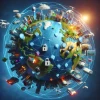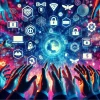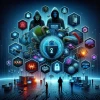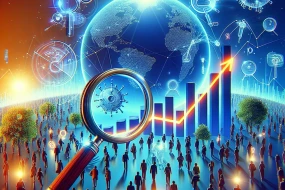
Welcome to the vast universe of the Internet of Things, where everyday objects transform into intelligent devices. From your morning coffee maker to complex industrial machinery, IoT is revolutionizing our world. But as we embrace this technological marvel, understanding its applications and security concerns becomes crucial. This guide sheds light on how IoT is reshaping industries and the steps needed to safeguard these innovations.
Understanding the Internet of Things
The Internet of Things, or IoT, is essentially a network of interconnected devices that communicate with each other via the internet. These 'things' include everything from home appliances and wearable technology to industrial equipment and smart city infrastructures. By enabling these devices to collect and exchange data, IoT offers unprecedented convenience and efficiency. Imagine a world where your refrigerator orders groceries when you're running low or your thermostat adjusts itself based on your preferences. This isn't science fiction; it's IoT in action.
Applications of IoT Across Industries
1) **Smart Homes**: IoT-enabled devices like smart thermostats, lighting systems, and security cameras offer homeowners increased control and convenience. For instance, smart locks allow you to secure your home remotely, while smart lighting can be programmed to suit your mood or schedule.
2) **Healthcare**: Wearable devices such as fitness trackers and smartwatches monitor health metrics, providing real-time data to users and healthcare providers. This can lead to better patient outcomes through continuous monitoring and early detection of potential health issues.
3) **Manufacturing**: IoT is pivotal in smart manufacturing, where connected machinery enhances production efficiency and reduces downtime. By utilizing predictive maintenance, companies can foresee equipment failures and schedule maintenance proactively, saving both time and money.
4) **Agriculture**: Smart farming uses IoT devices to monitor crop health, soil conditions, and weather patterns. Farmers can optimize water usage and improve crop yields, leading to more sustainable agricultural practices.
5) **Transportation**: IoT applications in transportation include fleet management systems that track vehicle locations and conditions. This improves logistics, reduces fuel consumption, and enhances safety through real-time monitoring.
Security Challenges in IoT
As IoT devices proliferate, so do the security challenges. Many of these devices are built with limited processing power, making them vulnerable to cyberattacks. Common security issues include:
1) **Weak Authentication**: Many IoT devices lack robust authentication mechanisms, making them easy targets for hackers.
2) **Data Privacy**: IoT devices collect vast amounts of personal data. Without proper encryption, this data can be intercepted and misused.
3) **Firmware Vulnerabilities**: Outdated or unpatched firmware can be exploited by attackers to gain unauthorized access to devices.
4) **Network Security**: IoT devices often communicate over unsecured networks, providing a potential entry point for cybercriminals.
Ensuring IoT Security: Best Practices
Securing IoT devices requires a multi-layered approach. Here are some best practices:
1) **Use Strong Passwords**: Always change default passwords to something unique and complex.
2) **Regular Updates**: Keep device firmware and software up to date to protect against vulnerabilities.
3) **Network Segmentation**: Isolate IoT devices on a separate network to minimize the impact of a potential breach.
4) **Encryption**: Implement strong encryption protocols to protect data in transit.
5) **Monitor and Audit**: Regularly monitor IoT devices for unusual activity and conduct security audits to identify potential risks.
The Future of IoT
The potential of IoT is vast and continues to grow as technology evolves. Innovations like edge computing and 5G networks are set to enhance IoT capabilities further, offering faster data processing and more reliable connectivity. As the IoT ecosystem expands, the focus on security and privacy will become even more critical, ensuring that these advancements benefit society without compromising safety.






























